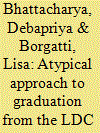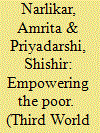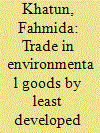|
|
|
Sort Order |
|
|
|
Items / Page
|
|
|
|
|
|
|
| Srl | Item |
| 1 |
ID:
152078


|
|
|
|
|
| Summary/Abstract |
The term ‘the least developed countries’ (LDCs) is widely understood to designate, exactly as stated, the world’s least developed countries. In conjunction with the 2015 United Nations (UN) triennial review of the LDC category, this article attempts to critically evaluate the UN’s list of LDC countries in the light of various indicators – economic, social, political, military and security related, and psychological. It concludes that the official and actual lists of LDCs, despite important similarities, are not completely identical. The term ‘the LDCs’ as used by the UN is therefore not fully consistent with the reality it attempts to designate and describe.
|
|
|
|
|
|
|
|
|
|
|
|
|
|
|
|
| 2 |
ID:
117801


|
|
|
|
|
| Publication |
2012.
|
| Summary/Abstract |
From the creation of the category in 1971, the number of least developed countries (LDCs) has almost doubled to account for 48 members by 2011. Only three countries have managed to exit from the category thus far, and two more are in the pipeline. The recognition of the difficulty of leaving the category is entrenched in the overarching goal of the Fourth UN Conference on LDCs, which specifically calls for halving the number of LDCs within the next decade. The existing asymmetries between the entrance and the graduation criteria have favoured inclusion. Of the three exit criteria, those countries that have graduated, or are in the process of doing so, have all met the low-income exit threshold. This study argues for a graduation path that is not linked to income performance, rather on human capital development. In so doing, it identifies a different, non-conventional route to graduation. Bangladesh makes a good example for it as it is through the development of its human capital assets that it could (a) stop being an LDC and (b) accelerate its rate of economic and income growth. If the appropriate human capital enforcement policies are implemented in the coming 22 years, Bangladesh could meet the graduation thresholds by 2027, graduate out of the LDC group in 2033 and keep all the benefits linked to the LDC status until 2036. At the domestic level, actions aimed at leaving the LDC category have to be framed by, and within, a national employment-generating strategy. The article concludes with specific policy recommendations, particularly related to human capital development, for nearing the estimated graduation date.
|
|
|
|
|
|
|
|
|
|
|
|
|
|
|
|
| 3 |
ID:
146453


|
|
|
|
|
| Summary/Abstract |
The World Trade Organization’s (WTO) Ministerial Conference at Bali in December 2013 seemed to have marked a landmark moment in the history of the negotiations of the Doha Development Agenda (DDA). This article begins with a brief analysis of why the DDA has been quagmired in deadlocks and become the longest running trade round in the history of the multilateral trading system. It then discusses the significance of what was achieved at the Bali Ministerial in light of repeated failures and particularly from the perspective of the world’s poorest countries. It explains why and how breakthroughs were achieved and highlights several important institutional innovations. Lastly, it discusses how sustainable these innovations might be.
|
|
|
|
|
|
|
|
|
|
|
|
|
|
|
|
| 4 |
ID:
135057


|
|
|
|
|
| Summary/Abstract |
After over a decade of languishing in stalemate, the Doha Development Agenda – the first round of trade negotiations launched under the auspices of the World Trade Organization – finally achieved a breakthrough at the Bali ministerial in 2013. Given that the Doha mandate places development – and particularly the concerns of the Least Developed Countries (ldcs) – at the heart of its agenda, our paper focuses on what the Bali outcome means for the world’s poorest countries. As a first step we provide a brief background against which the Bali negotiations took place. In the second section we assess the achievements and limitations of the Bali outcome, focusing on the ldc-specific package and also commenting on other issues that affect the ldcs. In the third section we explain the reasons for some of the achievements at Bali, which include negotiating strategies used by the ldcs themselves. In the fourth and final section we identify a plan of action for the future.
|
|
|
|
|
|
|
|
|
|
|
|
|
|
|
|
| 5 |
ID:
120076


|
|
|
|
|
| Publication |
2012.
|
| Summary/Abstract |
Liberalization of environmental goods and services as laid out in the work programme of the Doha Ministerial Declaration of the World Trade Organization has implications for least developed countries as these countries are vulnerable to climate change. They need to follow and participate in the negotiation in order to achieve market access opportunities for environmental goods and services of their interests in the global market and to access cleaner technologies at an affordable price. Such participation will be meaningful if it is backed by informed arguments based on analytical exercise. This article estimates that export of environmental goods by least developed countries stood at 0.08 per cent and import at 0.82 per cent of global exports and imports of environmental goods, respectively, in 2007. The article suggests that even with low trade, least developed countries stand to gain through reduction of tariff and non-tariff barriers on environmental goods. This will, however, have to be combined with appropriate technology transfer and adequate financial support.
|
|
|
|
|
|
|
|
|
|
|
|
|
|
|
|
|
|
|
|
|